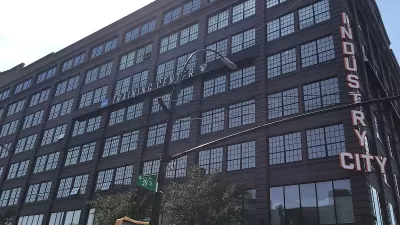A writer points to surprising statistics about Brooklyn—mainly that much of the borough is growing poorer as real estate prices fall—to make a point about how the common gentrification narrative fails cities.
According to Daniel Kay Hertz, "one problem with our obsession with gentrification as the end-all of urban equity issues is that it discourages us from talking about other important things happening in our cities."
"Case in point: Brooklyn is getting poorer."
Hertz cites a post from "data-crunching blog extraordinaire Xenocrypt," which notes that "from 1999 to 2011, median household income in Brooklyn fell from $42,852 to $42,752." After mapping median income on the neighborhoods within the borough, it's evident that a "good three-fifths" of Brooklyn is getting poorer. The same trend of stagnation stays true for real estate prices in much of Brooklyn, which are actually falling.
That the larger picture goes underreported, according to Hertz, is a failure to recognize the full urban dynamics of Brooklyn and New York City (and, for that matter, San Francisco). Says Hertz of the common, diminished journalistic and advocacy perspectives: "we’re being deprived of an accurate sense of what is actually going on in our cities…how can we claim to be working for fairer, more equitable, etc., cities, if we’re ignorant of their most basic economic and demographic changes?"
FULL STORY: More on the Limits of Anti-Gentrification Politics: Brooklyn is Getting Poorer

Alabama: Trump Terminates Settlements for Black Communities Harmed By Raw Sewage
Trump deemed the landmark civil rights agreement “illegal DEI and environmental justice policy.”

Study: Maui’s Plan to Convert Vacation Rentals to Long-Term Housing Could Cause Nearly $1 Billion Economic Loss
The plan would reduce visitor accommodation by 25% resulting in 1,900 jobs lost.

Planetizen Federal Action Tracker
A weekly monitor of how Trump’s orders and actions are impacting planners and planning in America.

Waymo Gets Permission to Map SF’s Market Street
If allowed to operate on the traffic-restricted street, Waymo’s autonomous taxis would have a leg up over ride-hailing competitors — and counter the city’s efforts to grow bike and pedestrian on the thoroughfare.

Parklet Symposium Highlights the Success of Shared Spaces
Parklets got a boost during the Covid-19 pandemic, when the concept was translated to outdoor dining programs that offered restaurants a lifeline during the shutdown.

Federal Homelessness Agency Places Entire Staff on Leave
The U.S. Interagency Council on Homelessness is the only federal agency dedicated to preventing and ending homelessness.
Urban Design for Planners 1: Software Tools
This six-course series explores essential urban design concepts using open source software and equips planners with the tools they need to participate fully in the urban design process.
Planning for Universal Design
Learn the tools for implementing Universal Design in planning regulations.
Caltrans
Smith Gee Studio
Institute for Housing and Urban Development Studies (IHS)
City of Grandview
Harvard GSD Executive Education
Toledo-Lucas County Plan Commissions
Salt Lake City
NYU Wagner Graduate School of Public Service





























